Religions in Action for the Protection and Restoration of Forests: Lessons from the Interfaith Rainforest Initiative in Brazil, Colombia, DRC and Peru
20220309On March 1, 2022, the United Nations Environment Assembly (UNEA), hosted the Faith for Earth Dialogues, during which leaders from the Interfaith Rainforest Initiative, as well as the UN and the Government of Norway, came together to speak about the critical work by faith communities to halt and reverse tropical deforestation. (see recording here)
Religions for Peace is a proud partner to the Interfaith Rainforest Initiative, which hosts and supports the country programs to implement their vital work to protect the tropical rainforests and their indigenous guardians.
Opening remarks and moderation
Dr. Charles McNeill – Senior Advisor, Forests & Climate at UN Environment Programme (UNEP)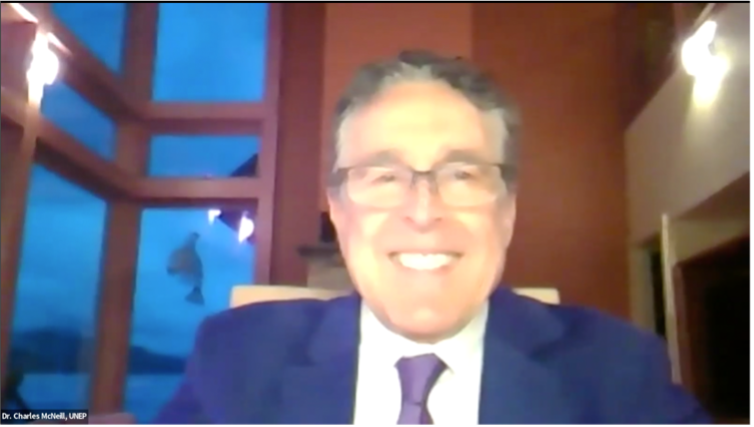 Outlined the commitment of the United Nations to protect, restore and sustainably manage forests, particularly tropical forests, for the achievement of sustainable development. He further highlighted that the Interfaith Rainforest Initiative provides a platform for religious leaders and organisations to (i) educate and raise awareness about the seriousness of the deforestation crisis and viable solutions, (ii) inspire on-the-ground action to protect and restore forests, and (iii) advocate for laws and public policies that protect forests and the rights of indigenous peoples in Brazil, Colombia, Democratic Republic of the Congo, Indonesia and Peru. He added “It won’t be possible to meet the goals of the Paris Climate Agreement without decisive action to end tropical deforestation (—) The Interfaith Rainforest Initiative shows that religious leaders and organizations have a critical contribution to make to the coalition of partners working to protect forests and the rights of indigenous peoples”.
Outlined the commitment of the United Nations to protect, restore and sustainably manage forests, particularly tropical forests, for the achievement of sustainable development. He further highlighted that the Interfaith Rainforest Initiative provides a platform for religious leaders and organisations to (i) educate and raise awareness about the seriousness of the deforestation crisis and viable solutions, (ii) inspire on-the-ground action to protect and restore forests, and (iii) advocate for laws and public policies that protect forests and the rights of indigenous peoples in Brazil, Colombia, Democratic Republic of the Congo, Indonesia and Peru. He added “It won’t be possible to meet the goals of the Paris Climate Agreement without decisive action to end tropical deforestation (—) The Interfaith Rainforest Initiative shows that religious leaders and organizations have a critical contribution to make to the coalition of partners working to protect forests and the rights of indigenous peoples”.
Ambassador Hans Brattskar – Special Envoy, Ministry of Climate and Environment, Government of Norway Noted that, despite the unique contribution religious communities can 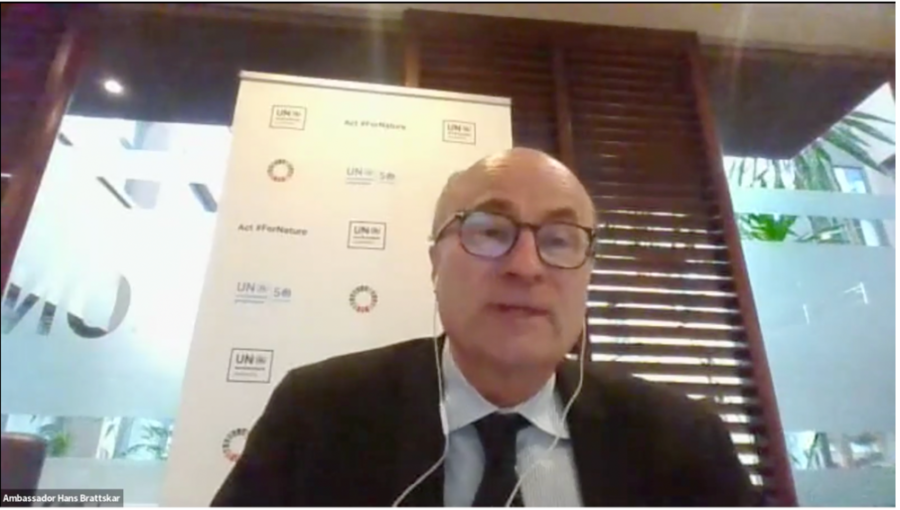 make, they have been largely missing from the movement to end tropical deforestation. For this reason, he added, Norway’s International Climate and Forest Initiative (NICFI) joined forces with the United Nations and a group of cross-sector partners to launch the Interfaith Rainforest Initiative in order toinspire people in new ways and reach them at a deeper level of values and ethics. Amb. Brattskar mentioned how important it is to bring new urgency, new momentum, and new energy to halt and reverse tropical deforestation, and concluded: “The protection and restoration of the planet’s rainforests is a top priority for the Government of Norway, and the Interfaith Rainforest Initiative is a key program for us.”
make, they have been largely missing from the movement to end tropical deforestation. For this reason, he added, Norway’s International Climate and Forest Initiative (NICFI) joined forces with the United Nations and a group of cross-sector partners to launch the Interfaith Rainforest Initiative in order toinspire people in new ways and reach them at a deeper level of values and ethics. Amb. Brattskar mentioned how important it is to bring new urgency, new momentum, and new energy to halt and reverse tropical deforestation, and concluded: “The protection and restoration of the planet’s rainforests is a top priority for the Government of Norway, and the Interfaith Rainforest Initiative is a key program for us.”
Lessons from the Interfaith Rainforest Initiative in Brazil, Colombia, DRC and Peru
Carlos Vicente – National Facilitator, IRI Brazil Provided background on the profound challenges facing the Brazilian Amazon, including on socio environmental governance and the 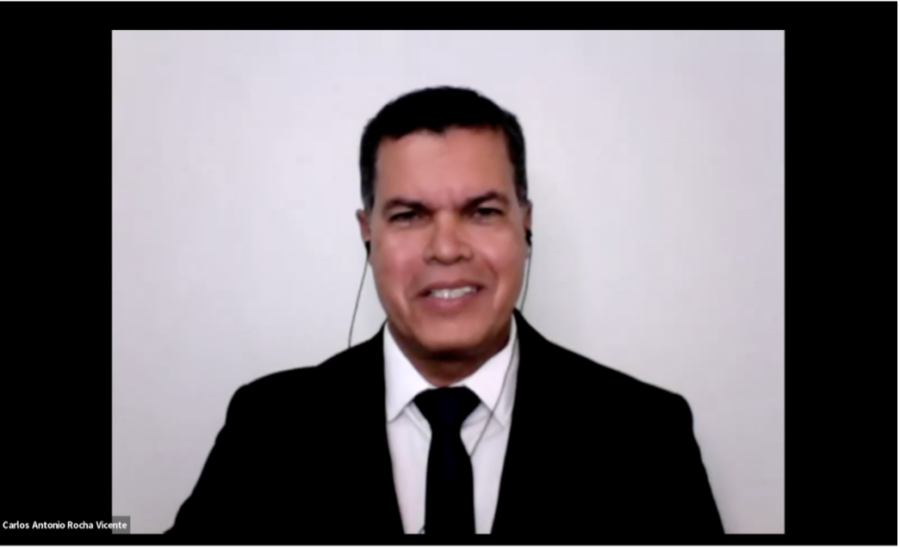 protection of human rights and environmental defenders. He explained how IRI Brazil works to increase the engagement and impact of religious leaders and communities in the protection of the Amazon and its indigenous peoples, strengthening the efforts of civil movements and organizations. He added “The role of religious leaders in shaping values and their potential to mobilize public action is huge. This is because caring for nature and human dignity are fundamental values for all religious traditions.”
protection of human rights and environmental defenders. He explained how IRI Brazil works to increase the engagement and impact of religious leaders and communities in the protection of the Amazon and its indigenous peoples, strengthening the efforts of civil movements and organizations. He added “The role of religious leaders in shaping values and their potential to mobilize public action is huge. This is because caring for nature and human dignity are fundamental values for all religious traditions.”
Rev. Aureo Rodrigues de Oliveira – Independent Presbyterian Church; Advisory Council member, IRI Brazil Provided an overview of how religious scripture provides a moral 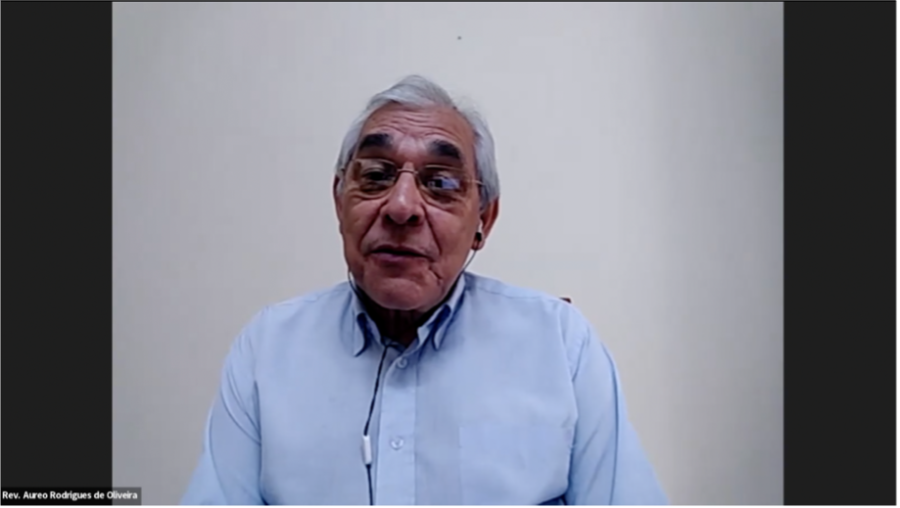 basis for all Christians to participate in the work of IRI. He noted how God created humans to take care of the Earth, and how we must never cease to give up hope, educate our communities and work together. He further added that “Climate change is a tangible example of the destruction and disorganized use of nature” and emphasized that human beings “should have had a relationship of sustenance and enjoyment with nature, but instead it turned into a destructive predatory relationship”
basis for all Christians to participate in the work of IRI. He noted how God created humans to take care of the Earth, and how we must never cease to give up hope, educate our communities and work together. He further added that “Climate change is a tangible example of the destruction and disorganized use of nature” and emphasized that human beings “should have had a relationship of sustenance and enjoyment with nature, but instead it turned into a destructive predatory relationship”
Blanca Echeverry – National Facilitator, IRI Colombia Highlighted how IRI Colombia established 36 local chapters in priority rainforest areas of the country, and their approach to 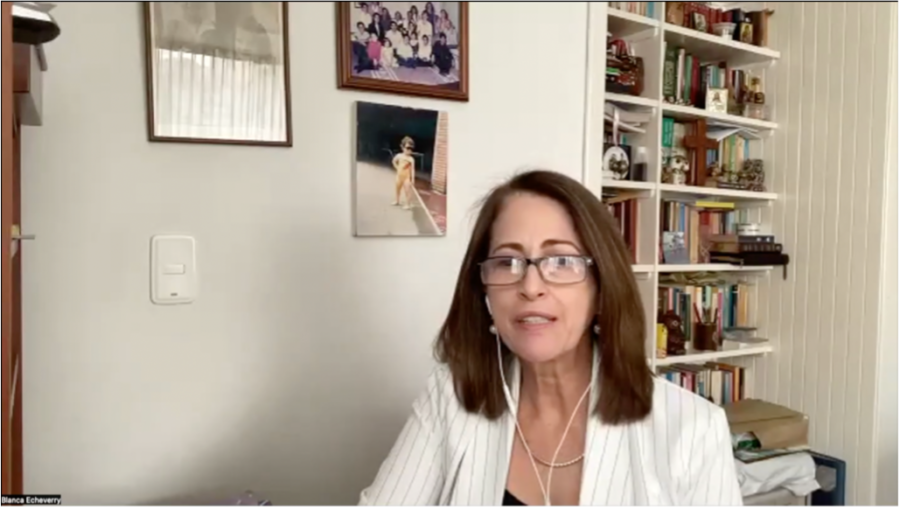 strengthening the capacities of religious leaders to act to protect tropical rainforest. She further spoke of the many achievements within the recent years including, the development of an advocacy strategy, the advances of the parliamentary front for the protection of Amazonia and agreements with the chambers of commerce, and closed on an inspiring note, “IRI Colombia reaffirms its conviction that the strengthening of capacities of local communities constitutes one of the most important activities to defend the Amazon rainforest and that the leadership of churches and faith communities is key to achieving the speed and scale of change indispensable to end deforestation and restore the Amazon.”
strengthening the capacities of religious leaders to act to protect tropical rainforest. She further spoke of the many achievements within the recent years including, the development of an advocacy strategy, the advances of the parliamentary front for the protection of Amazonia and agreements with the chambers of commerce, and closed on an inspiring note, “IRI Colombia reaffirms its conviction that the strengthening of capacities of local communities constitutes one of the most important activities to defend the Amazon rainforest and that the leadership of churches and faith communities is key to achieving the speed and scale of change indispensable to end deforestation and restore the Amazon.”
Bishop Francisco Duque – Anglican Church of Colombia; Advisory Council member, IRI Colombia Expressed his gratitude towards IRI for providing a platform for religious leaders 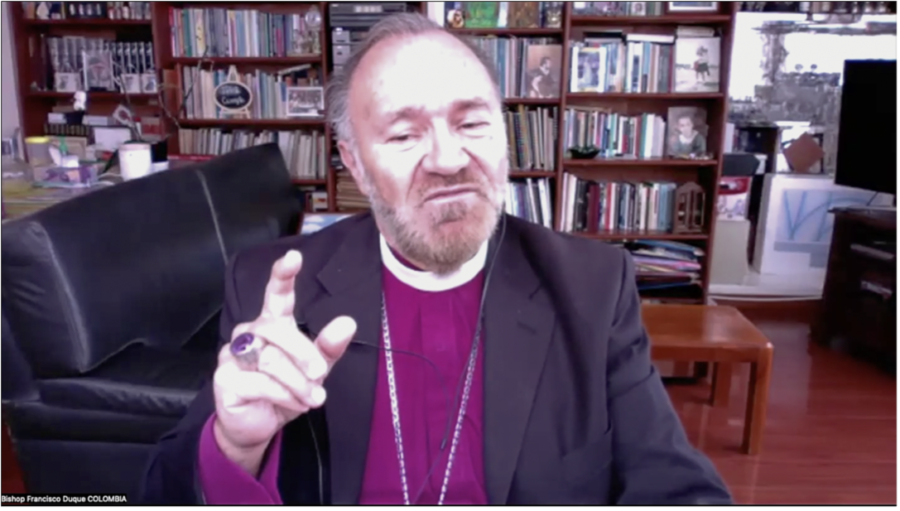 to communicate the urgency to act in favor of tropical forests and the rights of their ancestral inhabitants, adding “all religious beliefs and spiritualities share the imperative to protect trees, forests and their inhabitants, in short, we share the imperative to protect and restore Creation”. He describes the importance of collaborative dialogue among different churches, spiritualities and faith communities and how the influence and authority of religious leaders is one of the best tools for communicating about the deforestation crisis and ways to act to stop it.
to communicate the urgency to act in favor of tropical forests and the rights of their ancestral inhabitants, adding “all religious beliefs and spiritualities share the imperative to protect trees, forests and their inhabitants, in short, we share the imperative to protect and restore Creation”. He describes the importance of collaborative dialogue among different churches, spiritualities and faith communities and how the influence and authority of religious leaders is one of the best tools for communicating about the deforestation crisis and ways to act to stop it.
Laura Vargas – National Facilitator, IRI Peru Described the tropical deforestation crisis in Peru, and how it has expanded in during the COVID 19 pandemic alongside increasing corruption 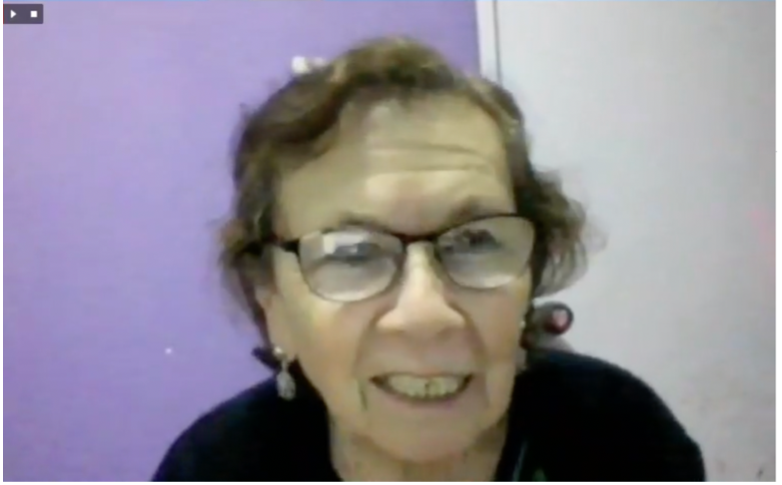 and illegality in the country. She highlighted some achievements of IRI Peru, such as the opportunity to present IRI’s work and agenda to the last three Peruvian presidents and the signing of a cooperation agreement with the Ministry of the Environment to coordinate efforts in the protection and defense of forests. She also highlighted the launching of a “Pact for the Amazon “, which highlights the economic, social, environmental, and human value of the Amazon region by creating spaces for dialogue between religious communities, government, business, civil society and indigenous peoples. She added, “IRI Peru will work to strengthen and empower religious leaders in their role as defenders of the forests with their own spiritualities. Their voice will be heard in this urgent defense of God’s creation and its peoples, so that the cry of the Earth and the cry of the indigenous peoples are heard and respected.”
and illegality in the country. She highlighted some achievements of IRI Peru, such as the opportunity to present IRI’s work and agenda to the last three Peruvian presidents and the signing of a cooperation agreement with the Ministry of the Environment to coordinate efforts in the protection and defense of forests. She also highlighted the launching of a “Pact for the Amazon “, which highlights the economic, social, environmental, and human value of the Amazon region by creating spaces for dialogue between religious communities, government, business, civil society and indigenous peoples. She added, “IRI Peru will work to strengthen and empower religious leaders in their role as defenders of the forests with their own spiritualities. Their voice will be heard in this urgent defense of God’s creation and its peoples, so that the cry of the Earth and the cry of the indigenous peoples are heard and respected.”
Monseñor Alfredo Vizcarra – Coordinator of Red Eclesial Panamazónica (REPAM) in 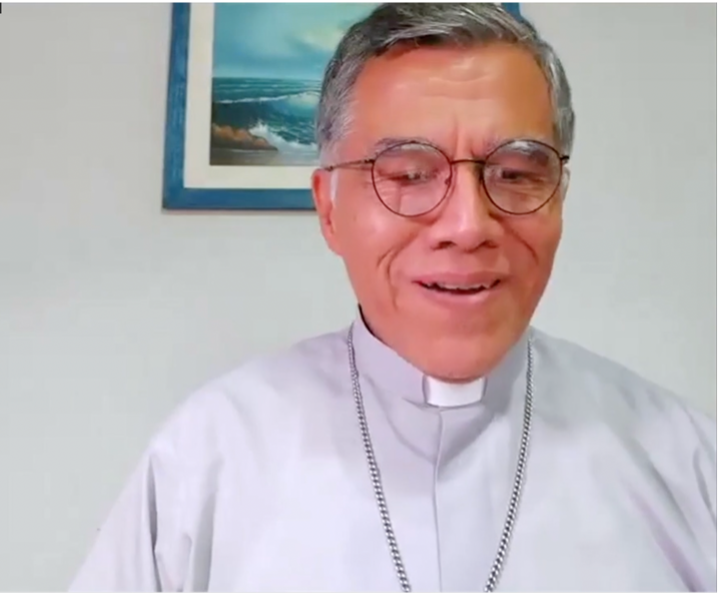 Perú; Advisory Council member, IRI Peru Emphasized the urgency for action in the
Perú; Advisory Council member, IRI Peru Emphasized the urgency for action in the
Peruvian Amazon, “There is an enormous difference between those who have the capacity to extract and enrich themselves from the bounty of the Amazon and those who do not. The kind of life that these people have left to the indigenous people is in a very sad state.” He called for training to build the capacity of people of faith to act with urgency to end deforestation for Amazonian communities. He added “We cannot keep saying, ‘say your prayers and move on’ we need to take action. I believe that the Interfaith Rainforest Initiative has a very key role in this call to action”
Rev. Matthieu Yela Bonketo – National Facilitator, IRI Democratic Republic of Congo (DRC) Highlighted the advocacy plans that have been developed by IRI-DRC, in order to raise the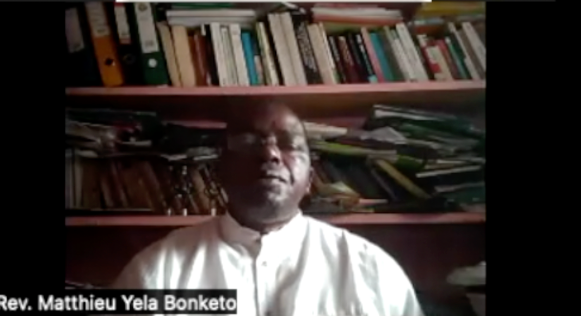 awareness and to develop clear positions of the religious communities on key policy issues in the country, which can be presented to the government. He added that “IRI DRC plans to sit with officials of the governmental institutions to find ways to formulate legislative proposals to protect tropical rainforests and the rights of indigenous communities.” He further outlined how IRI-DRC supported a campaign for the adoption of a historic new legislation around the rights of indigenous Pygmy people, for which religious communities worked hand-in-hand with indigenous peoples to rally the religious Congressmen and women to vote in favor of the law.
awareness and to develop clear positions of the religious communities on key policy issues in the country, which can be presented to the government. He added that “IRI DRC plans to sit with officials of the governmental institutions to find ways to formulate legislative proposals to protect tropical rainforests and the rights of indigenous communities.” He further outlined how IRI-DRC supported a campaign for the adoption of a historic new legislation around the rights of indigenous Pygmy people, for which religious communities worked hand-in-hand with indigenous peoples to rally the religious Congressmen and women to vote in favor of the law.
Rev. Eric Nsenga – Secretary General of the Commission for Justice, Peace and Safeguarding Creation of the Church of Christ in Congo (ECC) Acknowledged the 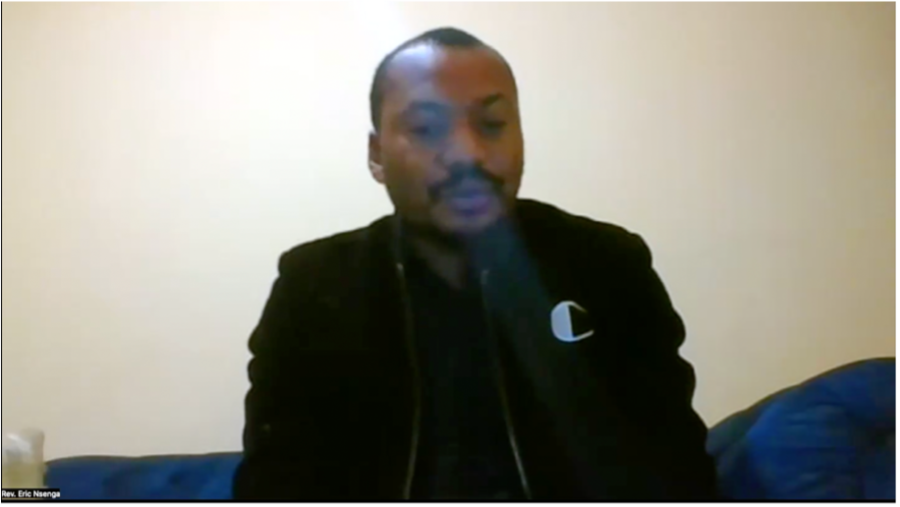 important work of IRI DRC and highlighted that collaboration between religious leaders, customary chiefs and indigenous communities has come quite naturally, since the common values of the Congolese people embrace the protection of tropical rainforests. He added, “traditionally the national values in the DRC already inspire us to understand and respect each other as human beings but also the forest as part of nature and part of ourselves”. Further emphasizing the relevance of working with religious leaders on the IRI program, he added that “the forest is seen as a form of healing, both physical and spiritual. The forest is also seen as a beneficiary of the protection that we owe it because it safeguards creation and is a place of meditation and recognition of the divine”.
important work of IRI DRC and highlighted that collaboration between religious leaders, customary chiefs and indigenous communities has come quite naturally, since the common values of the Congolese people embrace the protection of tropical rainforests. He added, “traditionally the national values in the DRC already inspire us to understand and respect each other as human beings but also the forest as part of nature and part of ourselves”. Further emphasizing the relevance of working with religious leaders on the IRI program, he added that “the forest is seen as a form of healing, both physical and spiritual. The forest is also seen as a beneficiary of the protection that we owe it because it safeguards creation and is a place of meditation and recognition of the divine”.